by Jenny Rose | Jul 5, 2018 | Power
“Always forgive your enemies; nothing annoys them so much.”
― Oscar Wilde
It’s been a chaotic week for me of fear, memories, fire, grief, a couple of new friends and unfinished emotional business resulting in a foul snarl of neglected feelings. Also, in common with millions of others, we are sweltering under a heavy blanket of heat and humidity and I feel about as attractive as a slime mold.
My old home place, my old community in Colorado, is burning. I’m not there. I’m glad I’m not there.
I should be there. I hate myself for not being there.
I’ve written before about blessing the ground between us. Now my mind is filled with the ground I once lived on, and all I can see are the horrifying images of flames, smoke, and the ashy remains of structures and scorched land. I spend hours every day searching the web for updates from local command and incident centers, the local papers, TV and radio and residents who post pictures and videos. I watch interviews with old friends and weep. I see video clips of my town and it’s like a ghost town, the streets empty and everything looking sere and dry because of drought. Towers of smoke loom and the air is an eerie sullen color. This should be the height of the tourist season there, the streets busy, flowers growing, and shade trees green and cool.
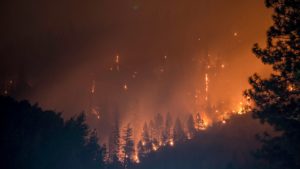
Photo by Matt Howard on Unsplash
Now there are tens of thousands of scorched acres between me and my memories of that place. I bless the ground between us. Given time and water, it will renew, but I think water is no longer a certainty and my lifetime will have run its course before the land recovers and the forests regrow. In a strange sort of way, the desolation of all that scorched earth echoes the desolation I feel as I watch nations, communities, and people become more divisive and competitive. It seems we’re getting more and more skilled all the time at scorching the ground between us, soaking it in blood and then sowing it with salt. We do not forgive differences. We carry hatred between peoples from one generation to the next, and many are at work in the world to increase the divisions by fanning the flames with rhetoric and disinformation, and pouring gasoline onto the fire in the form of resentment, ignorance, and fear.
We do not forgive. We are not forgiven.
Never have despair, powerlessness and fear seemed so darkly seductive to me as they do in these times. My experience is only an infinitesimal part of what’s happening now on Planet Earth, and I’m quite sure we have not yet descended as far as we’re going to. At times, it’s only by deliberately stoking my stubbornness and will and refusing to take my gaze away from where my power is that I continue to cling to faith in some kind of a cosmic balance and plan in spite of fear.
I’ve been spending a lot of time recently thinking about my family and dealing with some of the aforementioned unfinished business. I’ve written letters, both to the dead and to the living, some that have been sent and others that never will be. As I make new friends, I listen to what we talk about, watch how we get to know one another and feel the flowing give and take of compassion and support healthy female friendships create.
“I wondered if that was how forgiveness budded; not with the fanfare of epiphany, but with pain gathering its things, packing up, and slipping away unannounced in the middle of the night.”
― Khaled Hosseini, The Kite Runner
Over and over again, in all these places in my life, I stumble upon the theme forgiveness: The power of it; the terrible, helpless pain of feeling unforgiven; the weapon we make of it; the fear we will not be — cannot be — forgiven for whatever our particular stain or shame is. I have lately asked myself and others: Am I unforgivable? Can that be true? Can love be true without forgiveness? How do I continue to demonstrate love and connection in the face of obdurate unforgiveness? When others told me I was unforgivable, did they mean it, or am I still bleeding over something they have, in fact, forgiven?
It struck me this morning, as I lay in bed at 6:00 a.m. with the rattling roar of the window air conditioner in my ears and the damp sheet over my sweaty body, I’ve once again lost my way, been seduced by the false comfort of victimhood. I’ve been lost in the tangled maze of all those messy feelings and forgotten, temporarily, the point is not what anyone else does about forgiveness. The point is, and the power resides in, what I do with it. Furthermore, the biggest question of all is the one I haven’t been asking.
Can I, do I, will I forgive myself?
That’s where my power is.
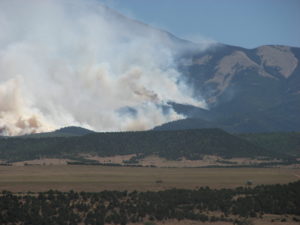
East Peak Fire, Huerfano County, CO 2013
Can I forgive myself for living in this lovely green, lush, landscape where we do still have water? Can I forgive myself for reading the signs of what was to come in the long, unending drought and fires in my old place and leaving before I was forced out by climate change and fire? Can I forgive myself for the mother, daughter and sister I was and am? Can I forgive myself for loving, trusting, hoping, believing, trying, accommodating, pleasing and failing? Can I forgive myself for all the years of neglect, silencing and abuse I colluded with and perpetrated toward myself? Can I forgive myself for now recognizing and responding to my own feelings and needs first? Can I forgive myself for writing or speaking the simple truth?
Forgiveness is a slippery concept, like tolerance. I don’t think of forgiving as forgetting. I’d be foolish to forget what I’ve learned as I interact with others. I’ll cripple myself if I don’t forgive. For me, forgiveness is an integral part of loving. Forgetting is not. Nor do I equate forgiveness with trust. Trust can be lost and rebuilt, but it takes time. Trust depends on forgiveness, but forgiveness doesn’t necessarily include trust.
I’m not at all sure we can create a better world together without forgiveness. I’m quite sure we won’t forgive one another if we’re unable to forgive ourselves. As resources shrink, we’re going to be forced onto a more level playing field in terms of our standard of living. Some of us have a lot more to lose than others. The have-nots are filled with rage. The haves are filled with fear.

Photo by Evan Kirby on Unsplash
There will be a lot to learn in the years ahead. I might as well start now to work with forgiveness, to befriend it, to embrace it, and to talk about it. Forgiving and letting go are both easier for me to do externally than internally, but internal work is the one place where we all have equal power. That’s where it must begin. We’re going to need our power, and we’re going to need to manage it well in order to survive. When our houses, businesses, cars and stuff disappear in fire, storm and flood, when our arable land becomes too hot to grow food, when no water comes from the tap and when money no longer allows us to pretend it’s not all happening, then we will rediscover what true power is, and then perhaps we can begin to bless the ground between us, forgive what has come before, and find new ways to collaborate and cooperate with the living system we call Earth.
In the meantime, I think I’ll stop begging others for forgiveness and concentrate on the places where I have power. Others may think of me as unforgivable, but I needn’t agree, and no one can prevent me from forgiving another.
“The weak can never forgive. Forgiveness is the attribute of the strong.”
― Mahatma Gandhi, All Men are Brothers: Autobiographical Reflections
My road to self-forgiveness may be long. It’s hard to take back the power of forgiveness, because now I have to be responsible for granting or withholding it. In some ways, it’s easier to beg others for it. If it’s not forthcoming from others, well, it’s not my fault. The path of self-forgiveness, though, is all up to me. It will be interesting to discover what sort of shame, guilt and self-loathing lurk in my internal terrain. It will be interesting to challenge the power of what others think and navigate by my own stars and compass. It will be interesting to put out fires on my side and observe whether others are invested in keeping them smoldering or assist in quenching them so the ground between us can heal.
Here’s a poem by Wendell Berry mapping the journey of self-forgiveness. It’s a good map. I’m taking it with me.
Do Not Be Ashamed
You will be walking some night
in the comfortable dark of your yard
and suddenly a great light will shine
round about you, and behind you
will be a wall you never saw before.
It will be clear to you suddenly
that you were about to escape,
and that you are guilty: you misread
the complex instructions, you are not
a member, you lost your card
or never had one. And you will know
that they have been there all along,
their eyes on your letters and books,
their hands in your pockets,
their ears wired to your bed.
Though you have done nothing shameful,
they will want you to be ashamed.
They will want you to kneel and weep
and say you should have been like them.
And once you say you are ashamed,
reading the page they hold out to you,
then such light as you have made
in your history will leave you.
They will no longer need to pursue you.
You will pursue them, begging forgiveness.
They will not forgive you.
There is no power against them.
It is only candor that is aloof from them,
only an inward clarity, unashamed,
that they cannot reach. Be ready.
When their light has picked you out
and their questions are asked, say to them:
“I am not ashamed.” A sure horizon
will come around you. The heron will begin
his evening flight from the hilltop.

Photo by Yuan Yue on Unsplash
All content on this site ©2018
Jennifer Rose
except where otherwise noted
by Jenny Rose | Mar 8, 2018 | Choice, Power
Selchie: A mystical creature who takes the form of a seal in the sea and a human on land.
I have a picture book from my childhood called Greyling, by Jane Yolen. It’s one of my favorite stories, by one of my favorite authors, and I’ve told it as an oral storyteller for many years. When I began doing storytelling, I sought out all the selchie stories I could find and incorporated them into my programs.
I rarely tell a selchie story without fighting back tears.
I’ve lately revisited this wonderful material for the second book in my Webbd Wheel series, and it occurred to me to explore why these stories touch me so painfully and deeply.
Selchie stories appear in the Hebrides, Iceland, Orkney, Scotland, Ireland and the Faroe and Shetland Islands. Like all lasting oral traditions, they contain blueprints for navigating loneliness, exile, love, loss, competition, compassion, trust and power. A good story has many facets.
A common thread in selchie stories is that a seal comes to land, takes off its skin, and becomes human, usually a beautiful young woman. Subsequently, the skin is stolen by a man and the woman entrapped. In many of the tales, she marries the man who has her skin (always a fisherman) and bears his children. Sometimes her husband promises after a certain number of years he’ll allow her access to her skin again, but he doesn’t follow through for fear of losing her. Inevitably, the skin is found, often by a child, and returned to the selchie, who must then face a choice between her life with her family and her life in the sea.

Photo by Jeremy Bishop on Unsplash
It is this choice that makes me weep. I know the agonized longing for what we are made of but can’t ever quite find.
As I observe the world and people around me, I think many of us feel in some way exiled from who we were born to be, from a place, from a tribal connection, from some integral expression of self. I believe this exile creates such an unbearable hunger we grasp at anything within our reach in order to appease it, becoming addicts, developing eating disorders and body dysmorphism, and struggling with anxiety and depression. We live in a culture of distraction and entertainment. We’re busy, noisy, exhausted, and inundated with information, stimulation, propaganda, manipulation and demands.

Photo by Anna Dziubinska on Unsplash
We want what we are made of, but how do we find what that is? Why is it taken away or withheld from us? Why are we so often forced to choose between one thing we’re made of and another? This all lies at the heart of selchie stories, for the selchie is a creature torn between two worlds and two tribes, and we instinctively recognize this conflict.
Choice is so often grief. If a selchie re-dons her skin and goes back to the sea, she cannot return, for she already knows the terrible cost of losing her skin, and though she may love her children and even have grown to love the fisherman she’s with, she cannot trust him. In returning to the sea, she is joyous, but now the grief of leaving her children and the life she made on the land replaces her longing for the sea.
I was with a man who avoided choice. He said he didn’t like to choose one thing in case something better came along. My experience of this was that he didn’t want to commit. It meant we couldn’t plan a date, a weekly ritual or even a walk. If we did, he frequently cancelled at the last minute. It was painful for me, and it frayed our connection considerably as I vacillated between hurt and anger. Eventually, I gave up and made my own plans. I told him that his maybe-I-will and maybe-I-won’t approach didn’t avoid a choice but was a choice. He refused to take responsibility for that, and he was bitter about the choices I made subsequent to his.
I’ve also been with partners who believe we can have it all. One man walked away from any situation in which he couldn’t have his cake and eat it too. It was a point of pride with him. He didn’t see why he shouldn’t have it all, and, as far as he was concerned, the world (and I) owed him that. Looking back, I see this as just another evasion of the heartbreak and consequences of having to make choices.
I think very few of us have the luxury of having it all. We come together and move apart, searching, fleeing and climbing ladders we hope end in success. Many of us feel rootless in terms of place and tribe. We don’t really feel we belong anywhere on a map, and we have no rightful place in a human circle. We do the best we can, a choice at a time, and over the years those choices and their consequences teach us who we are and turn us into adults.
What we’re made of is not necessarily what we’re born into. What we’re made of is not necessarily the place we live in, the people surrounding us, the job we have, the clothes we wear, the car we drive or the color we dye our hair. What we’re made of is not always who we want to be, who we insist we are or who we’re expected to be. Discovering what we’re made of is an excavation of our dreams, our souls and our joyous bodies. Many of us spend our whole lives finding one piece of ourselves at a time, stumbling, groping, picking up and discarding, searching blindly in the dark with nothing but our feelings to guide us.
On one particular day of no special consequence, my small toddling self, clothed in a yellow bathing suit with white trim, was lifted into a pool of water as big as the sea. From that day to this I’ve loved the water, and during occasional long, dry spells without access to swimming I dream of water and wake myself weeping with the anguish of my longing.
I’m a creature of water. It’s part of what I’m made of.
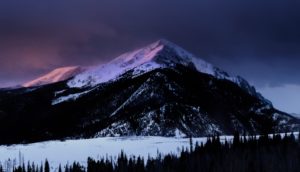
Photo by Nathan Anderson on Unsplash
For some years I lived in a city and laid awake at night watching headlights move across the ceiling and walls, straining to hear a precious moment of silence in between the sound of cars and sirens and too many restless people moving through the pale night. I dreamed of high, snow-covered mountains under starry skies and the peace of trees in unbroken darkness. Every day I died a little more, but I knew in my heart one day, one day I would leave the city and live in the shadow of the mountains I dreamed of. A thousand nights later I freed myself from the tentacles of that city, but I also left behind my marriage and the father of my children, my belief in happy-ever-after, the most lucrative job I ever had and the good wife and mother I wanted so much and tried so hard to be.
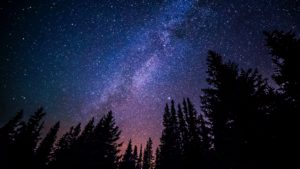
Photo by Ryan Hutton on Unsplash
At last, I slept in the shadow of snow-covered peaks in a small mountain town without pavement and street lamps and sirens. When I awoke at night, I heard the cry of the vixen, the rushing wind, the owls calling to one another, the sound of the bear eating apples from the tree outside my window, or the raccoons cavorting in the tops of the pear trees like furry pirates.
I did not have it all. I had another piece of what I’m made of. I chose it, and I paid for it. I’m still paying for it, twenty years and thousands of miles later, and whatever the cost, it’s worth it. I cannot live in the city.
By the time my life is over, will I know everything I’m made of? Will I have lived with enough courage to choose what I’m made of, come what may? Will living true to what I’m made of sustain me? Will I ever find my own sealskin wedged between rocks, or locked away in a chest, or hidden in the thatch?
Reclaiming what I’m made of, one choice at a time. My daily crime.
The selchie lives in a small cottage on the shingle beside the sea. She lives with a fisherman whose face is carved with a lifetime of loneliness that she has relieved. She and her children gather seaweed and driftwood, mend nets and dry fish and watch for the fisherman’s return, lighting a lamp and setting it in the window to welcome him home in the evenings. She lies with her man at night and listens to him sleep, and the waves come in, and the wind sighs through the beach grass, and she thinks of her sea kin and wonders how it is with them and if she’ll ever see them again.

Photo by Kace Rodriguez on Unsplash
The selchie takes the folded sealskin from her child and holds it to her breast, weeping, smelling its fading perfume of fish and sea, rubbing its softness against her cheek. She tells her children she loves them, but she must leave, and they clutch at her hands and her skirts, crying, not understanding what is happening. She tells them they will see her again, but in a different form. She cannot stop to explain, lest the fisherman return and her chance for freedom is lost. She stumbles out of the house, casting aside her clothing as she goes, until she stands naked in the surf and steps into the skin. The children follow, stricken and wailing, pleading with her not to leave, but her need for what she is made of is even greater than her love for them, and the surf takes her gladly in its embrace and carries her out. She looks back one more time, her great, dark eyes full of tears, before she dives into the arms of what she is made of and disappears.
All content on this site ©2018
Jennifer Rose
except where otherwise noted
by Jenny Rose | Feb 15, 2018 | Contribution, Emotional Intelligence
I’ve been trying to frame a post around generosity for several months. Interestingly and unexpectedly, the idea of generosity has remained a Gordian knot in spite of word webs, notes and lengthy simmering in the back of my mind. Since I began chewing on the idea of generosity, I’ve discovered Unsplash, a site offering free use of photographs for things like this blog, and now I finally feel I’m getting a grip on the subject.
Unsplash features more than 300,000 photos from more than 50,000 contributors. It’s free to use and free to join. Users may upload photographs for whatever they want as frequently as they want.
If generosity is unconditional readiness or liberality in giving, Unsplash is surely a fine illustration of the concept. The Internet is filled with people practicing their art. Some are trying to make a living. Many, like me, provide free content. Others start out contributing freely and then uplevel in order to earn a little bit of money with advertising, an Amazon affiliate program, a subscription fee, etc. In my view, some of the content out there is worth paying for, and other content is not.
Unsplash is worth paying for. Many of the photographers who contribute are professionals with content to sell, yet they continue to share some of their work freely with others.
Up to this point, I haven’t made a dime on this blog. It wasn’t about the money, but exercising my voice, my writing skills and my courage. I had no idea where it would go or what would happen with it. I had no idea if anyone would read what I wanted to write or how much I would grow to value the weekly practice of posting and maintaining a blog. I do want, however, to publish and sell my books in the future.
I think part of my struggle to get my head around generosity has been my own damaged sense of value. Those of us who feel we’re worthless assume we’ve nothing to give. I can’t tell you how many times I’ve declined attending a pot luck, a fundraiser, a party or even a funeral. I tell myself I have nothing to contribute, I was invited out of obligation or kindness, and nobody will even notice my absence.

Photo by photo-nic.co.uk nic on Unsplash
I am not Cinderella, and I do not possess a fairy godmother who will make me socially acceptable or worthy.
I wonder, looking back, if others have experienced me as being ungenerous or mean because of my lack of social contribution, when what was really at work was introversion, social anxiety and an abysmal sense of self-worth. I have no way of knowing.
On the other hand, I’ve volunteered my whole life. I’ve spent years working with children as a librarian, tutor, child development clinician, teacher’s aide, swim teacher and parent. I’ve participated in fire and rescue work as a volunteer EMT, as well as with animal rescue organizations. I’ve volunteered in libraries and as an oral storyteller, and I’ve volunteered as a dancer. I’ve worked in hospitals, nursing homes, public schools and libraries.
See? Nothing to contribute.
I earned a paycheck for some of that work, but one doesn’t get rich doing the kind of jobs I love to do, and the paycheck was never my motivation. I just loved the work. I felt as though I was making a difference in every one of those roles.
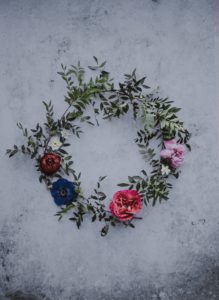
Photo by Annie Spratt on Unsplash
I’ve always limited the idea of generosity to financial resource. Part of my shame about my poverty is that I’m unable to be financially generous, which I’ve believed automatically makes me stingy and uncharitable. If my generosity is measured by what I spend, it’s so small as to be negligible. I’m a rotten capitalist consumer.
In thinking deeply about generosity, I can see how my beliefs have distorted my view. I wrote some time ago about the failure of money, and that peeled away some of my limiting beliefs, but only the first layer or two. If I make generosity about money, I can never be generous, and I block the financial generosity of others toward me because I can’t reciprocate in kind. My desire to give is greater than my desire to receive. I desperately want to make a contribution. I feel disempowered when I can’t reciprocate someone’s generosity in a way that feels equal, and then I disconnect.
Unhooking generosity from money changes the way I look at it. Developing some trust in my own value also changes the way I think about generosity. Now I wonder if money is perhaps the least reliable indicator of generosity, not the most. Money is very visible and obvious in the world, but that doesn’t make it the most useful contribution. There have been times in my life when I’ve been in desperate need of money, but many, many more times when I’ve been in significantly more desperate need of someone to hold me, someone to believe in me, encourage me and simply love me. Money is easier to come by, believe me, than love and acceptance. Writing a check, donating a few dollars to the organization of our choice or buying a gift is easier, for many of us, than effectively communicating our love and appreciation for those around us in words or actions.
Some people give only to receive. On the face of it, it looks like generosity, but it’s not. My understanding of true generosity is it has no hidden agenda. Conditional generosity is like conditional love; control and manipulation pretending to be something else. Behavior seeking power over others, or freighted with unacknowledged expectations, is the reverse of generosity.
Another way in which people use generosity to mask control is to force a “gift” onto another. In this case, someone informs us about what we need and we understand we’d better damn well accept it and be grateful. Refusal is out of the question because of an unequal power dynamic. Acceptance of the “gift” also perpetuates an unequal power dynamic, because we’re expected to demonstrate appropriate gratitude (as defined by the gift giver) for something we didn’t want or need in the first place. We’re not allowed to express or receive what we really need, only submit to what someone else needs to give in order to get something for themselves.
A good litmus test for discerning authentic generosity is whether it occurs in anonymity. People giving to receive will never do it quietly. There’s always a camera, a video, a witness or a headline. There’s always a score card, a quid pro quo. There’s always a distorted power dynamic. Such people give to reward and withhold to punish.
You want to star in my production? Meet me on the casting couch and maybe I’ll put in a word for you.
At the end of all this excavation, I’ve finally begun to make friends with generosity. I am capable of being truly generous, and I have generous people in my life. I can discern the difference now between the real thing and a ploy to maintain or grab power. I may not have money, but I can appreciate, marvel and share. I can say thank you. I can give anonymously. I can exercise a generous compassion towards myself and others for our weaknesses and mistakes. I can recognize my desire for reciprocity and power-with as important pieces of my own integrity and freely disconnect from people and situations that don’t support what I need.
This takes me back to Unsplash. I know in this day and age it’s hard to think past the money, but as a creative person on line with free content I can assure you no amount of money outweighs the gratification of knowing I’ve made a connection, that something I write resonates with someone else. Money is important, and I wish I had more of it. If I can uplevel the blog in small ways to earn a little bit of money, I’ll do it. The real reward, though, is when someone reaches out to me and says, “Yes! Me, too! Your words made a difference in my day.” It just doesn’t get better than that.
Because of that, I’ve developed a habit of contacting a couple of photographers every week whose work appears in this blog. Behind each photograph is someone living a life, struggling with the things we all struggle with, sharing their unique vision and eye with the world just because. Unconditionally. I go to their website, if they have one. I explore their pictures and read about who they are. I contact them and briefly introduce myself. I thank them for their collaboration with me, a collaboration invisible to them unless I reach out. I express my appreciation for their contribution. It doesn’t take very long. It’s not as fast as writing a check or reciting a credit card number, but it’s a lot more fun.
So far, every single one has responded to say thank you. Thank you for acknowledging my unique creativity. Thank you for taking the time to remember the person behind the camera. Thank you for collaborating with me so we enhance one another’s contribution.

Photo by Jeremy Bishop on Unsplash
There is no exchange of money in this generosity, only of humanity. They give freely. I accept the gift and add it to my own, paying it both forward and backward.
Generosity: Unconditional readiness or liberality in giving.
Please take a moment and meet photographers Jeremy Bishop and Annie Spratt.
All content on this site ©2018
Jennifer Rose
except where otherwise noted
by Jenny Rose | Jan 25, 2018 | Power
Arguing with what is.
Possibly the most fruitless endeavor in the world.
Yet many of us consistently argue with how we are, how others are, and how the world is.
Arguing with what is is like living in an unending war. Clinging to a story inconsistent with what is requires constant vigilance. Our lives begin to revolve around the fear that the truth we refuse to acknowledge will escape or be exposed.

Photo by Ian Espinosa on Unsplash
We cannot allow that to happen, so we put all our energy into convincing ourselves that what is isn’t. Then we start trying to persuade others to validate our particular reality because God speaks to us, or we’re especially victimized, marginalized, enlightened, rich or powerful. If we can’t persuade others, we try to create and enforce rules requiring them to fall into line, to agree, at least tacitly, with our point of view and belief system. We scorn critical thinking, science and evidence-based data. We discourage questioning, careful definitions and nuances. We create jargon, acronyms, blacklists and smear campaigns. We enlist the sympathy, empathy, kindness and compassion of well-meaning but naïve people. We set up zero sum games, use gaslighting, violence, abuse, projection, deflection, sweeping and inaccurate generalizations and distortions. We hurt ourselves, and we hurt others.
Arguing with what is is a full-time job.
My particular version of arguing with what is takes place mostly in my head. For example:
I don’t feel loved.
What? How can you say that? Remember that one kiss at the beginning, the most passionate kiss of your life? You know you want that again! Think of how funny he can be, how charming, how much fun! If you don’t feel loved it’s because you’re not trying hard enough. You’re ungrateful. You’re disloyal. You’re a bad partner. You don’t deserve him. You want too much. You’re needy and demanding. Of course he loves you, he’s just not comfortable saying it! You are happy and loved. Get a grip!
I don’t feel happy or loved.
I had this ding-dong conversation with myself for years. I desperately and repeatedly tried to convince myself I was both happy and loved, but I could never quite silence that deep internal voice that went right on saying, “I don’t feel loved.” It wouldn’t shut up. After years of this nonsense, I finally got so exhausted I stopped arguing with my true feelings and ended the relationship. Then, one day I came across narcsite dot com and immediately recognized the narcissist-empath dynamic.
You know what? I was right. I didn’t feel loved because I wasn’t, in fact, loved.

Photo by Travis Bozeman on Unsplash
Arguing with what is means fear and self-doubt are my constant companions.
So what’s the other side of the coin? What’s the fix for arguing with what is?
This magical phrase: However this needs to be, it’s okay with me.
Say it aloud: However this needs to be, it’s okay with me. Is it a lie? It usually is a lie for me when I first apply it to any given situation. I want things to be predictable, controlled and adhere to my expectations and standards. I expect that of myself, of others and of the world.
I haven’t had great luck with that expectation. The rebellious world is chaotic, unpredictable and unexpected. I’m not in charge of anyone but myself, and my feelings (along with the rest of me) are disobedient and refuse to be controlled.
My need for control and predictability are rooted in fear and lack of trust in myself. If, at any moment in any day, however things need to be is not okay with me, I know I’m dealing with fear or lack of self-trust, and those are both places where I have all the power. That instant refocus from avoiding, denying or refusing an inconvenient or unexpected truth or reality over which I have no power to the very center of my power clears away anxiety, confusion and fear. What happens in me, in a day, or in the world is not really the problem. The problem is in the way I manage my power and my choices. Addressing my own power and choices allows me to say, with perfect truth, that however this needs to be, it’s okay with me.
Being okay with the ways things are doesn’t mean endless love, light and turning the other cheek. It doesn’t mean I accept boundary violations, bullying, coercion, violence or any other kind of power-over games. It doesn’t mean I tip-toe through life pleasing others, following rules and keeping silent. It doesn’t mean toadying to the political correctness police. It doesn’t mean I feel no frustration or disappointment, or that the status quo should remain unchallenged and unchanged. It means clarity about where my power is.
Nobody wants a flat tire, herpes, an unwanted pregnancy, a cancer diagnosis, mental illness, the flu or to lose a loved one. We don’t want superstorms that wipe out our homes, the uncertainties and anxiety of climate change or food and water shortages. Nobody voted for lead in their drinking water, or to experience genocide. Nobody wants to be silenced, attacked, abused, marginalized, shot or scapegoated.
Yet all these things are. They’re real, along with many magical, wonderful things, and I can’t change the way things are.

Photo by Ludde Lorentz on Unsplash
I can only change the way I am. I can decide when and how to speak. I can decide how I interact with others. I can listen, learn, research, ask questions, think critically and decide where I stand on important issues. I can speak up for those without voices. I can pay attention to my own integrity and operate within it. I can disengage, refuse to pick up poisoned bait, move away from where the blow is going to land (sometimes) and learn self-defense.
I can say no.
I can learn to trust my own courage, willingness to love, intelligence, feelings and ability to adjust and adapt to whatever happens. I can choose confidence and curiosity as companions.
I can make sure that however I need to be, it’s okay with me.
I can surrender to others in all their strengths and imperfections. Each one of us is however we need to be, sick or well, destroyer or hero, weak or strong, power-over or power-with. People in the world are okay with me, and I choose who I engage and connect with, who I support or hinder, who I share power with, who I collaborate and cooperate with and who I allow in my life.
However this minute, this hour, this day needs to be, it’s okay with me. If I catch the flu, it’s okay with me (Ugh). If I can’t get out of the icy driveway to go swimming, it’s okay with me (Rats!). If I reread the rough draft of this post and decide it needs to be rewritten before tomorrow when I post, it’s okay with me (what a pain in the neck!)
I can accept what is, deal with it, and go on.
Or I can argue with what is.
It’s a chocolate-or-vanilla choice, and we make it a hundred times a day.
Whatever you choose, it’s okay with me.
And So

Photo by freestocks.org on Unsplash
And so, after all, it was no use,
That desperate determination to please.
In the end a hidden, untamed thing
Always looked out of my eyes,
Beseeching for freedom,
And none of us could beat it down.
Now all the rigid outlines of my life
Have fallen around my feet in graceful folds.
I’ve counted silver threads and lines
And granted freedom.
If there’s no lover for what I am
I can kiss my own shoulders.
All content on this site ©2018
Jennifer Rose
except where otherwise noted
by Jenny Rose | Oct 5, 2017 | Emotional Intelligence, Feelings, Love
A few weeks ago I wrote about romance and in that post I confessed that at this point in my life I’m not sure what love actually is. A strange admission from a reasonably intelligent, well-educated, middle-aged broad with two marriages and two children in her history.
Writing that post enabled me to clearly separate romance from love; though I suppose love might include a little romance from time to time. I’m convinced romance is not synonymous with love, however. I began to make a mental list of what love is not, as I often approach things from the back door first. Love is not a synonym for:
- Romance
- Sex
- Slavery
- Control
- Possession
- Obsession
- A suicide pact
- Abuse
- Fear
- Duty
- Obligation
- Enabling
- Obedience
All right. So what is love? My Randall House Collegiate Dictionary says it’s “a profoundly tender, passionate affection for a person” or “a feeling of warm personal attachment or deep affection.” This definition doesn’t satisfy me at all. My rewrite is that love is a feeling of warm, tender connection and deep affection. I don’t think love is always passionate and I don’t like the word attachment. If anything, love implies to me an attitude of nonattachment.
But what about unrequited love? What about failed love or withdrawn love or love as a weapon or a tool? What about the inability to accept love, or feeling unloved though being told we are? What about those who make us feel our love is ugly, twisted, shameful or inadequate?
I’m always playing with words in my head. This week it’s “What is love?” and “What is a crone? and “What are the differences between compassion, empathy and sympathy?” I lie down with those inquiries and wake up with them. I turn them over while I shower, cook bacon, wash dishes, take my morning walk, practice Tai Chi and drive to town. I’m constantly scribbling notes.
I gave a neighbor a lift this morning and asked him to talk to me about compassion, sympathy and empathy. Poor man. He didn’t know what to make of me.
Yesterday, during my frosty morning walk, I dove into a stand of staghorn sumac below the barn and went to visit the spring. This is a daylight spring seeping out of the hill on which the barn and house stand. A long time ago, someone dug a well there, and at one time a pump and tank were installed, along with a system of black plastic outdoor lines to carry water to and from the barn, the garden, and down through the woods to, presumably, crops in the fields below. All the equipment is many decades old now, fallen over and covered with leaves and moss. The well is protected by a round cement cap, much too heavy for me to lift alone (drat!).
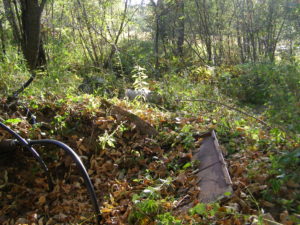
Spring
This spot is hidden in a thick tangle of vine, briar and trees. We rarely go in there, though it’s in close proximity to the barn.
It’s fall and it’s been dry, but the drainage where the spring emerges is clearly marked by rocks and moss. The ground underfoot felt soft, and when I brushed away the leaves I found moist earth. A yard or two below that is mud, and then a trickle of water and then, at the bottom of the hill, a quiet film of water, barely moving, reflecting the tree-laced sky. Right now It’s full of apples dropped from an apple tree that grows alongside it.
As I slipped and slid, tripping over vines and getting scratched by hawthorn and raspberry bushes, feeling the velvety moss coating the rocks and stepping cautiously on rotting wood, it occurred to me that love is like this spring.
I’ve always thought of love as an action verb, something I do to another in exchange for receiving the same. I thought I knew what I meant when I used the word, though I was never challenged to define it exactly. For me it’s been a catch-all term, synonymous with dozens of other, more specific actions: Want, need, desire, honor, trust, respect, care about, listen to, defend, make excuses for, enable, protect, support, believe in, etc., etc.
But what if love is just being? What if it has no object, but just is?
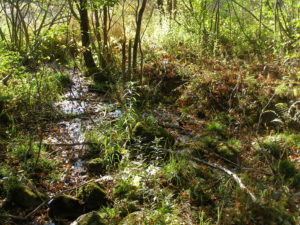
Spring
This little spring is absolutely true to itself. Water drains off the hillside above us and carves a path through the earth and rock until it emerges and runs down the surface at the foot of the hill. We pay no attention to it whatsoever. It’s reliable, predictable and faithful, but not because anyone is looking. Its unobtrusive, quiet presence has created a lush pocket of life, a complex system of plants, fungi, animals and insects, but ten yards away on the open hillside it’s invisible.
What if I make a choice to allow my feeling of love to run through my life in the same way the spring runs through and over the ground? What if I carry within me a wellspring, a hidden cleft, moist, fertile, filled with life, rich in sensuality, simply because it’s an expression of self? If others find their way to it, sit a while, bathe, drink, and allow it to nourish and refresh them, they’re welcome. If others can’t see it, or don’t value it, or dislike the perfume of rotting wood and leaves or the feel of plush moss under their bare foot, it’s nothing to do with me. Not everyone chooses to make their way through raspberry and hawthorn bushes, after all.
What if I don’t need anything in return because I’m giving nothing away? Perhaps the act of love can be a simple state of being, not a totality, not a hurricane of passion and lust, not a romantic fairytale, not a prison and torture chamber, but a spring, a waterway, a shining thread I can share without depletion. Can I allow it to seep quietly up through the roots of my experience, even if no one else ever finds it, wants it, returns it or deems it acceptable?
Our spring is part of a landscape of field and forest, river, pond and stream, rocky hillside and bog. The landscape contains many forms and embraces many systems of life. Birth and death happen on this land. Disease, erosion and flood happen on this land. Prey and predators carry out their sacred dance of balance here. Blood, bone, fur, feather, antler, musk, urine and feces are all here.
I, too, am a complex system of history, memory, belief, thought and feeling. I do not feel love for everyone and everything. My experience of love is that it’s a wild thing; it seeps up where it will and trickles away without warning, taking no account of rules and expectations. I can’t command it and I don’t choose to hold it back. My love doesn’t need anyone’s reception, appreciation, validation or praise.
Love is. I reserve the right to love as I will. I am the keeper of my own wellspring.
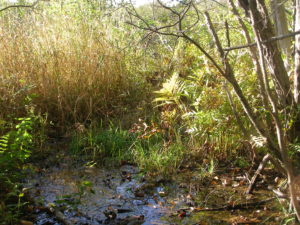
Spring 10/2017
All content on this site ©2017
Jennifer Rose
except where otherwise noted


















